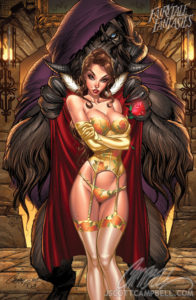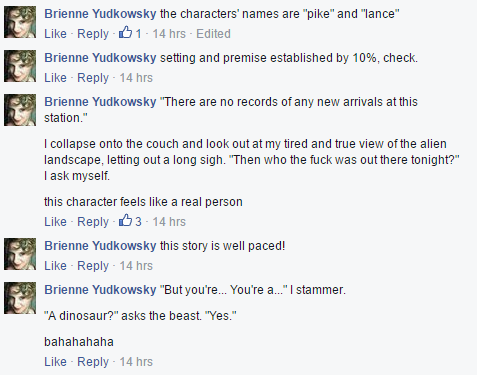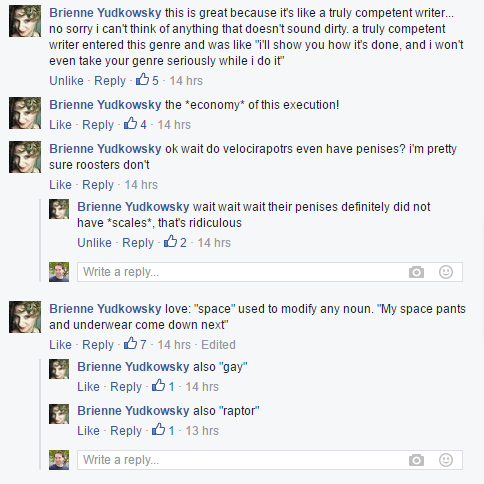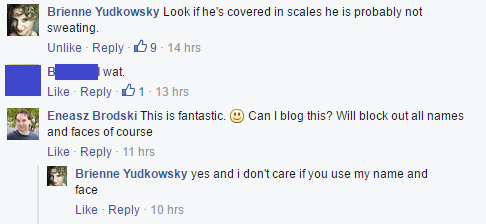 I started by saying that this backpack contains the entirety of my luggage! Flying only cost me $140 round-trip for that (literally cheaper than driving), and I was pretty proud. Then I remembered I cheated, and sent my Award Ceremonies Suit with a friend who was driving. So less proud now. :/ But from what I learned this year, I can say that I’ll be able to travel next time with just a single backpack for luggage without cheating!
I started by saying that this backpack contains the entirety of my luggage! Flying only cost me $140 round-trip for that (literally cheaper than driving), and I was pretty proud. Then I remembered I cheated, and sent my Award Ceremonies Suit with a friend who was driving. So less proud now. :/ But from what I learned this year, I can say that I’ll be able to travel next time with just a single backpack for luggage without cheating!

 I met Robin Hanson and Eliezer Yudkowsky in the flesh. And I got to have dinner with both of them!! It was fantastic! I would have liked to spend more time with both, but there was soooo much to do. Hopefully more next time. Eliezer was disappointed with the expertise level of some of the panels, which I feel is partly my fault, I should have warned him. This is a conference for SF writers and readers. Sometimes the con will get lucky and get a field-expert who is also a fan, and they are put on a panel. But in general the best you can ask for in technical subjects is a panel that’s up to date with the laity. A panel on AI will NOT address any actual leading research. It will maybe address how audiences consume and understand AI stories, and/or how authors can write compelling AI stories that don’t break suspension of disbelief.
I met Robin Hanson and Eliezer Yudkowsky in the flesh. And I got to have dinner with both of them!! It was fantastic! I would have liked to spend more time with both, but there was soooo much to do. Hopefully more next time. Eliezer was disappointed with the expertise level of some of the panels, which I feel is partly my fault, I should have warned him. This is a conference for SF writers and readers. Sometimes the con will get lucky and get a field-expert who is also a fan, and they are put on a panel. But in general the best you can ask for in technical subjects is a panel that’s up to date with the laity. A panel on AI will NOT address any actual leading research. It will maybe address how audiences consume and understand AI stories, and/or how authors can write compelling AI stories that don’t break suspension of disbelief.
It was fun trying to explain the appeal of Lovecraftian fiction to Robin. “It’s the horror of realizing you are a helpless inconsequential speck in a vast uncaring universe and your existence is meaningless? But that’s just regular life, all the time, for everyone.” Yes, but that’s what compartmentalization is for. :) As Eliezer said “Robin Hanson is far too psychologically healthy to ever be scared by existential horror.” Having met him, I totally agree. He is the friendliest person to serve as an inspiration for Quirinus Quirrell that I could imagine.
Eliezer also corrected my pronunciation of his name (after which the world’s biggest D’OH!!!! was uttered), and observed that this cons focus is primarily about reverence and admiration, rather than pursuing a goal or disseminating information. This is a good point, but I didn’t realize that anything else was expected. It’s literally a convention of huge SF fans, that cap off their con with a giant ceremony to give the people they most admire a fancy statue for being so damn cool. :) I had a great time playing my part in the prestige/admiration economy.
 Speaking of admiration!! I got to meet Ada Palmer!! The day before flying out to WorldCon I had just gotten to the mid-book reveal in her “Too Like The Lightning”, so I had to come up to her after a panel and rave about that. We talked for a bit, and she had to go, but she invited me to her Kaffeklatch on Saturday. I went and got to spend an hour in conversation with her, a lot of it about her book, and it was glorious! She is whip-smart and incredibly nice, and it was in the Top 3 Moments of WorldCon for me. I’m so glad I went, I really hope to talk with her more over time. The sheer depth and flavor of her ideas is intoxicating. And she has a sultry voice. :) Like an idiot I forgot to take a pic, so here’s a stock photo instead. More on her book in a few days!
Speaking of admiration!! I got to meet Ada Palmer!! The day before flying out to WorldCon I had just gotten to the mid-book reveal in her “Too Like The Lightning”, so I had to come up to her after a panel and rave about that. We talked for a bit, and she had to go, but she invited me to her Kaffeklatch on Saturday. I went and got to spend an hour in conversation with her, a lot of it about her book, and it was glorious! She is whip-smart and incredibly nice, and it was in the Top 3 Moments of WorldCon for me. I’m so glad I went, I really hope to talk with her more over time. The sheer depth and flavor of her ideas is intoxicating. And she has a sultry voice. :) Like an idiot I forgot to take a pic, so here’s a stock photo instead. More on her book in a few days!
In Don’t Do What Donnie Don’t Does news… I made an ass of myself briefly. For the past four years I’ve regretted not saying anything to GRRM when I shared an elevator with him at the Chicago WorldCon. It was just him and me in an otherwise empty elevator, and I froze up and didn’t say or do anything. It would’ve been a perfect time to get a pic or something. So this time when I saw him I rushed over and asked if I could get a selfie with him. He said he was in a hurry to get to his panel, and was pretty grumbly about it, but he did let me snap a pic. But I realized immediately that he was not happy, and I should have backed off, and I didn’t, and I’m an asshole. I am not posting that pic, because I don’t deserve to have a pic with him that was taken via ambush. I avoided him the rest of the con, and I desperately hope that he’ll forget me over the next two years. I’m sure he will. Right? :(
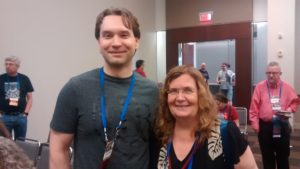 I’m worried because (prepare for mood whiplash) I went to a panel with Sheila Williams, editor of Asimov’s. Afterwards I approached her to thank her for publishing an unknown first-timer like me, especially given what she said about disappointing endings in the panel. AND SHE REMEMBERED ME BY SIGHT!! Like, WTF?? I’ve exchanged maybe three emails with her, two years ago! The best she could have done is seen that tiny little profile pic that comes with gmail. She was all “Well I only publish maybe 60 or 70 people per year, of course I remember my authors!” but man… holy crap! I was blown away. Better yet, she invited me to the Asimov’s/Analog party happening the next day! I got to meet all sorts of fascinating people there, including the author of Today I Am Paul (which would’ve been a nominee if not for the Puppies). It was a fantastic experience!
I’m worried because (prepare for mood whiplash) I went to a panel with Sheila Williams, editor of Asimov’s. Afterwards I approached her to thank her for publishing an unknown first-timer like me, especially given what she said about disappointing endings in the panel. AND SHE REMEMBERED ME BY SIGHT!! Like, WTF?? I’ve exchanged maybe three emails with her, two years ago! The best she could have done is seen that tiny little profile pic that comes with gmail. She was all “Well I only publish maybe 60 or 70 people per year, of course I remember my authors!” but man… holy crap! I was blown away. Better yet, she invited me to the Asimov’s/Analog party happening the next day! I got to meet all sorts of fascinating people there, including the author of Today I Am Paul (which would’ve been a nominee if not for the Puppies). It was a fantastic experience!
 A plush Frodo & Sam waiting for rescue in the dealer’s room, just cuz.
A plush Frodo & Sam waiting for rescue in the dealer’s room, just cuz.
I’ve posted before about my habit of con-spousing. Pretty much any con I go to, I tend to form a quick bond with someone and spend a lot of my free time/meals with them. It was interesting, this year I didn’t have a dedicated con spouse. The closest was Vivian (on my left, red dress), who I spent quite a bit of time with, both at parties and meals, especially in the last two days. She’s a friend from Colorado. :) I spent quite a bit of time with Laynie as well (on my right), who is sweet; and driven as hell, as every millennial I’ve met has been. I also spent a fair bit of time with Beth (not pictured, because again, I’m an idiot), who sadly kept having to do volunteer work so we didn’t get to hang out as much, but who has extremely similar taste as me in books (Grimdark 4evah!!) and gave me some fantastic recommendations, which I will attempt to inflict upon my book club! All in all, this was perhaps less emotionally satisfying as really bonding with a single person for 2-4 days, but I did get a wider variety of people met, so I don’t regret it either.
I also caught up with people I’ve met at previous cons (such as S.B. Divya and Seth Dickinson). Give me a few years, and soon I’ll be spending much of my con doing only that. :) It’s kinda nice, especially when you get to chatting late into the night and many of the barriers come down. (Tomorrow, notes on how exhausting it is to be Play Acting several days straight. Letting the mask slip late Saturday night with Seth and Vivian is another of my Top 3 Moments. So refreshing.) And when I needed a soul-recharge I could always count on Nikki, a very dear friend from Colorado, to sit with me for fifteen or twenty minutes and just friend out (which is like Bro-ing out, except without the Bro aspect). Many <3s Nikki!

I got to meet Ferret, and he’s absolutely as cool in real life as he is on his blog! I should have bought this man a drink!
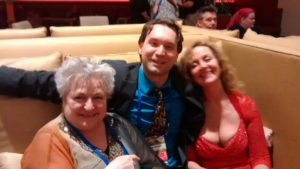 And, finally I got hang around with Pat Cadigan (closest to camera) for maybe a half hour, after the Hugo Award Ceremonies (she was the MC). CyberPunk is my Home Genre. It is what I read as I was coming of age, and it’s a core fixture of my psyche. To get to meet one of its god-parents was gratifying. :)
And, finally I got hang around with Pat Cadigan (closest to camera) for maybe a half hour, after the Hugo Award Ceremonies (she was the MC). CyberPunk is my Home Genre. It is what I read as I was coming of age, and it’s a core fixture of my psyche. To get to meet one of its god-parents was gratifying. :)
I already mentioned the Award Ceremony and the next day’s Business Meeting in yesterday’s post, so I won’t repeat those.
One major difference between this year’s post and last year’s post – no pics of the venue itself. Sasquan was absolutely gorgeous, even with the fires of Mordor at our doorstep. I fell in love, and I could move there. MidAmericaCon was nice enough… it was functional, and served its purpose. But there was no structural or natural beauty here. I won’t remember any visuals. This actually makes me feel really inadequate about the Denver Convention Center (in which we hold Denver Comic Con every year), because I think it’s the same thing. A large, uninteresting building, built for efficiency of convention-going. It looks like a giant office. There is nothing beautiful about it, or the immediately surrounding area. I hope San Jose is gorgeous! And I’m kinda sorta maybe considering going to Helsinki… maybe.
I had a great time!
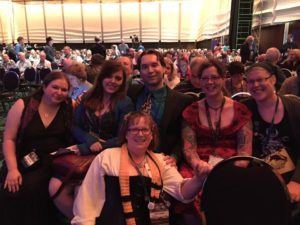



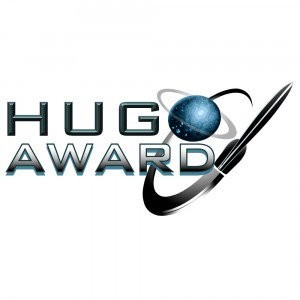 Most years we read all the Hugo-nominated short stories and novelettes in our book club, as generally all (or nearly all) of them are available free online. This year, that is not the case. :( (yes, I blame Vox Day). So we were unable to read them as a group. However I still read them myself for voting reasons, and my impressions are below.
Most years we read all the Hugo-nominated short stories and novelettes in our book club, as generally all (or nearly all) of them are available free online. This year, that is not the case. :( (yes, I blame Vox Day). So we were unable to read them as a group. However I still read them myself for voting reasons, and my impressions are below.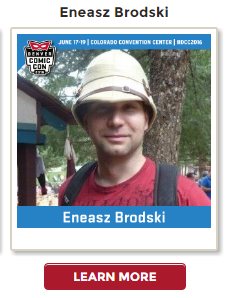
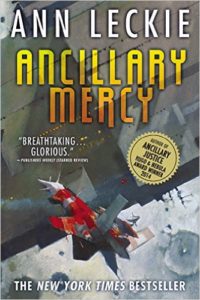

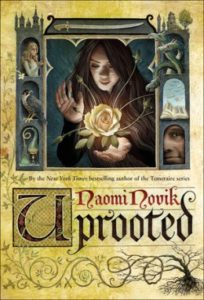

 The
The  So um… being immersed in non-stop Hugo Controversy and Tinglers over the last two weeks does weird things to one’s brain.
So um… being immersed in non-stop Hugo Controversy and Tinglers over the last two weeks does weird things to one’s brain.